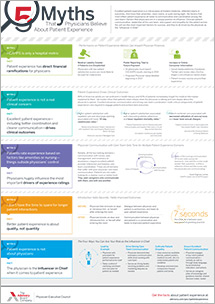Auto logout in seconds.
Continue LogoutPatients can help fellow patients navigate a new medical diagnosis in ways doctors can't, Aaron Carroll and Austin Frakt write for the New York Times' "The Upshot."
The benefits of peer health advice
"In an ideal world, when we are faced with a new health problem, a clinician is available to sit down and address all our questions and anxieties," Carroll and Frakt write. However, "[t]his ideal is rarely met," Carroll and Frakt add. "More typically, we're rushed through doctor visits that fly by too quickly."
With this reality in mind, Carroll and Frakt write, "Other patients can help," as they've had not only "have (or have had) your condition"; they've also had "your anxieties and questions" and "found a path through."
Moreover, Noel Peters, a cancer survivor patient who serves as a mentor to new patients, said, "There's a lot about the patient experience that doctors and nurses cannot convey because they haven't gone through it. You can get a much better sense of what it means to be a patient from another patient."
According to Carroll and Frakt, mentoring like the kind Peters does is called peer health advice, or peer-to-peer health care. Today, Carroll and Frakt explain, about one-quarter of patients receive information or counseling from someone who's had a similar diagnosis.
Further, "[t]he internet has made finding other people with your health problem easier," Carroll and Frakt write, citing, for example, the Database of Patients' Experiences—an "international collection of videos of patients sharing their experiences about various health conditions." Carroll and Frakt add, "This kind of sharing is similar to something humans have always done," noting people "routinely get advice about where to get [their] car fixed and which plumber to call."
Carroll and Frakt cite examples of research pointing to the benefits of peer counseling. For example, studies of diabetes management have found that patients who participate in peer-to-peer health care were able to lower their blood sugar level more than those who didn't, and studies on the effects of peer-to-peer health care in other areas have shown similar results, according to Carroll and Frakt.
In addition, Carroll has conducted focus groups of patients with various chronic conditions and many participants have said sharing their stories and connecting with other patients was the biggest benefit of participating in the research.
The downsides of peer health advice
However, despite the documented benefits, peer advice can come with risks, too. For instance, at times, it can be inaccurate, as everyone responds to treatment differently, Carroll and Frakt note.
Susannah Fox, an expert on peer-to-peer health care and a former HHS chief technology, said, "If it's high stakes, if you need an accurate diagnosis for a serious condition, you should see a professional. But for emotional support or a quick remedy for a minor issue, peers can be extremely helpful."
Further, Carroll and Frakt caution, "Peer advice shouldn't be confused with using the internet for diagnosis, a practice that studies have shown is not very accurate."
Nonetheless, Carroll and Frakt further note, "Few of us can read everything about our condition." They add, "Those who have gone before us can help sift through the mountain of information for what's most useful."
Carroll and Frakt write, "A new diagnosis or big change in health can be frightening. In such circumstances, we often have a lot of questions, but we may not know the range of possibilities for treatment or where to start." They conclude, "The health system can be helpful, but too often it isn't. A little help from friends can go a long way" (Carroll/Frakt, "The Upshot," New York Times, 7/9).
5 myths physicians believe about patient experience
Excellent patient experience is a critical piece of modern medicine, reflected clearly in outcomes. And more than amenities, clean rooms, or quiet during night, the factors that most inflect patient experience all relate to communication and coordination among the care team—factors that physicians are in a unique position to influence.
Clinician-patient communication, leadership of the care team, and support and empathy for the patient across the unit are the most important factors for success, and they're all driven by the physician as the "Influencer in Chief."
Don't miss out on the latest Advisory Board insights
Create your free account to access 1 resource, including the latest research and webinars.
Want access without creating an account?
You have 1 free members-only resource remaining this month.
1 free members-only resources remaining
1 free members-only resources remaining
You've reached your limit of free insights
Become a member to access all of Advisory Board's resources, events, and experts
Never miss out on the latest innovative health care content tailored to you.
Benefits include:
You've reached your limit of free insights
Become a member to access all of Advisory Board's resources, events, and experts
Never miss out on the latest innovative health care content tailored to you.
Benefits include:
This content is available through your Curated Research partnership with Advisory Board. Click on ‘view this resource’ to read the full piece
Email ask@advisory.com to learn more
Click on ‘Become a Member’ to learn about the benefits of a Full-Access partnership with Advisory Board
Never miss out on the latest innovative health care content tailored to you.
Benefits Include:
This is for members only. Learn more.
Click on ‘Become a Member’ to learn about the benefits of a Full-Access partnership with Advisory Board
Never miss out on the latest innovative health care content tailored to you.

